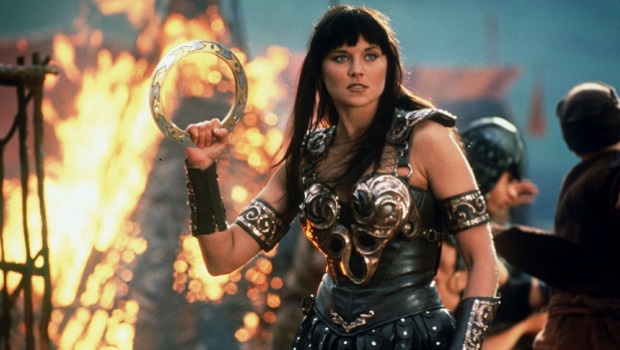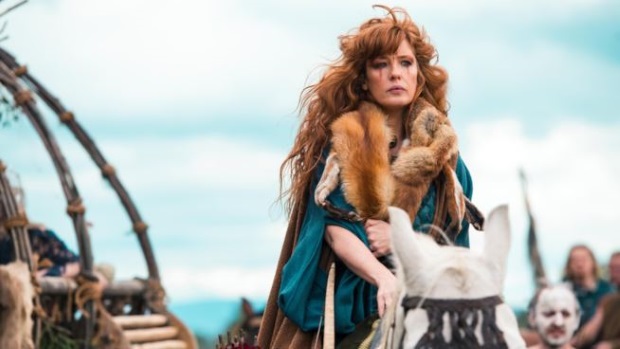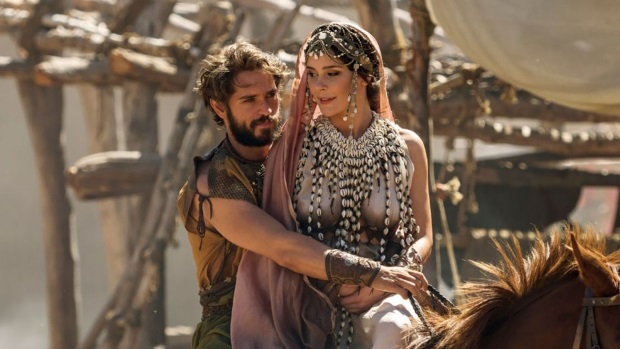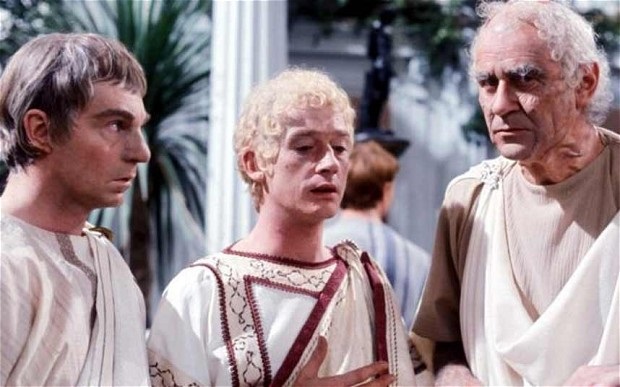What Makes a Good Ancient World Drama?
Where's the modern equivalent to I, Claudius? We look at how recent dramas set in the ancient world are missing the mark...
This article comes from Den of Geek UK.
Five months into 2018, we’ve already seen two new drama series set in the ancient world – Sky/Amazon Prime’s Britannia and the BBC/Netflix’s Troy: Fall Of A City. In the Great Battle of the Streaming Services, it seems Amazon has come out on top with this one, as Britannia has been renewed for a second season and its reception has been reasonably good. We await a decision on whether Troy: Fall Of A City will get a follow-up, but its reception has been distinctly more negative and viewing figures low. Neither series, at time of writing, seems destined to be an enduring classic, though only time and possibly future instalments will tell.
What is it, then, that makes a really great ancient world TV drama? Back in the 1970s, the BBC produced a 13-part adaptation of Robert Graves’ novels I, Claudius and Claudius The God. Although the critics were sniffy at first, the series was a huge hit and has had an enduring influence on TV period drama ever since. And yet, no other ancient-world-set period drama has enjoyed quite the same success or had the same impact. The most successful currently-running ancient world show, just coming off its fourth series, is not a drama but a comedy – ITV2’s wonderfully bouncy and acerbic Plebs.
The closest to snatching I, Claudius’ crown is Xena: Warrior Princess, a spin-off of Hercules: The Legendary Journeys and the next most influential ancient-world-set show. Each running for six seasons, Hercules and Xena were a very different sort of series from I, Claudius. Both were largely light-hearted (though capable of tackling serious drama, sometimes in musical form) and fit in with the general feel and tone of other 1990s action-adventure series.

No ancient-world-set series in the twentieth century has yet had the lasting impact of I, Claudius or Xena. The 2000s and early 2010s produced two reasonably successful series of the non-SFF variety – the BBC/HBO Rome and STARZ Spartacus. Both were well-received and popular, but Spartacus was the more successful in the sense that it achieved what it set out to do. Like I, Claudius, Spartacus told a clear story focused around a single character (aside from the prequel Gods Of The Arena), offering up a hefty dose of sex and violence, enhanced for gorier 21st century tastes and in the style of the movie adaptation of 300. Rome also offered that classic combination and was well-received, but bit off more than it could chew – the sumptuous production values and sprawling cast, covering events from several different perspectives, ended up making it too expensive and it was abruptly cancelled and forced to wrap up its epic story in a few episodes at the end of season two.
Then, in 2011, Game Of Thrones came on the scene. This show added another element to the already popular combination of provocative sex and violence – fantasy. While there are still plenty of non-fantastical period dramas around (Vikings is doing very well), writers and producers have leapt on the myths, legends and mysterious elements of ancient culture to try to ape that series’ success. Fantasy can be wonderful and at its best, it offers glorious epic adventure. Unfortunately, it’s very difficult to do well, and very easy to do badly.

The BBC’s Atlantis, which ran 2013-2015, took on former Game Of Thrones star Mark Addy in a lead role, but its true roots lay in a very different area. Atlantis was a Saturday night family adventure show, a direct replacement for the recently concluded Merlin, premiering during a year with almost no Doctor Who, in the mythic adventure story tradition of Xena and Hercules. As a family show, sex was largely kept to aggressive flirting and rather nasty violence could be threatened (being roasted alive in a mechanical bull, for example) but not actually shown.
Atlantis got a lot right. It had plenty of humor, which can sometimes be lacking in more po-faced dramas – perhaps too much, as the series would at times stray into broad comedy, then swing back into drama. That by itself is not necessarily a problem, but it takes skill to pull it off without the show feeling like it’s lurching from one style to another. Atlantis also tried to do interesting things with its source myths, and introduce arc plots relating to family relationships and the hero’s past. Unfortunately, its characters never quite became fully three-dimensional enough and it never really felt grounded in the way the best fantasy shows do. It was then re-scheduled to a later time slot, one its family-friendly style was not designed for, and cancellation followed.
And so, this year, we come to Britannia and Troy: Fall Of A City. Both are adult-oriented, grounded fantasy series, and the producers of both will have had the success of Game Of Thrones at the back of their minds. Like Game Of Thrones, both shows aim to foreground human interactions and human politics, bringing in the fantasy elements carefully so as not to overwhelm the human drama.

It’s no surprise that this has such an appeal when it comes to ancient world dramas, as even I, Claudius had just a little bit of mysticism to it, courtesy of an opening prophecy from the Sibyl. Accurate prophecies can be thrown in to spice up even the most mundane of shows – even Frasier included one. Both Britannia and Troy include a heavy focus on prophecies, which motivate the characters, though interestingly Troy includes the gods as active and present characters while Britannia openly doubts their existence.
Why, then, has neither show so far achieved the heights they are so clearly aiming for? Both have struggled with finding the balance between human drama and fantastical elements. Britannia’s use of fantasy is so cautious that it’s not always obvious the show is really a fantasy show at all – most of the fantastical elements could have a human explanation (hallucinations, drugs, the machinations of Druids, and so on). That’s a fascinating idea in itself, but then the series throws in the occasional more overtly fantastical element (impossible knowledge gained from the underworld) that leaves the viewer uncertain of the ‘rules’ of the world they’re watching.
Troy offers much more overt fantasy, with the gods taking an active role and appearing onscreen. But gods are very, very difficult to get right, especially on a show aiming for a grounded tone. Troy’s gods end up with no real characterization to keep our interest, being a bit too mysterious, and they disappear for lengthy periods while the human story gets on with it. Both shows might, in the end, benefit from dropping the fantasy angle and leaving us with humans and their own sets of beliefs and practices, since neither include the sort of simple, gripping fantasy imagery of Game Of Thrones’ zombies and dragons.

Troy also falls behind Britannia because it does too much all at once. The point of making a television series is to go into considerable depth with your story, and take your time to tell it. Rome may have ended up taking a bit too much time, but pacing is part of the secret of I, Claudius’ and Spartacus’ successes. Britannia covers about the right amount of material in its opening nine episodes. Covering only a short timespan, it takes in major events and drastic upheavals for its characters, but doesn’t stretch too far into the future, and hasn’t even revealed the name of one of its protagonists yet (I have a pretty good guess what that’s going to be, but only time will tell!).
Troy, on the other hand, was in such a rush to get to the ‘fall of a city’ promised by its title, that it raced through years of complex events in a mad rush to get to the end in just eight episodes. It’s a common error to attribute the story of the Trojan Horse to Homer’s Iliad – in fact, this story appears in Homer’s Odyssey and Virgil’s Aeneid, but not in the Iliad. Nor does the Judgment of Paris, the abduction of Helen or any of the build-up to the war. All 24 books of the Iliad take place within a short period of time towards the end of the war – it starts with the argument between Achilles and Agamemnon, and finishes with Priam’s ransoming of Hector. With so much mythology or history available, its very easy to get carried away trying to do it all – but ancient writers knew that pacing is key, and trying to tell the whole saga all at once won’t work.
In the end, though, the most important ingredient of all for any drama is characters the audience wants to follow. That means a mixture of characters the audience likes, characters they love, characters they may be attracted to, and characters they love to hate. In dramas about the ancient world, this can present quite a challenge, as both myth and history are chock full of deeply unpleasant people, leaving likeable characters hard to find and villains barely distinguishable from heroes (and, of course, every last one of them other than those involved in the Spartacus revolt is a slave-owner). I, Claudius got this balance just right. Claudius’ historical character was softened to make him a likeable lead, while Livia was built up from historian Tacitus’ hints into a Machiavellian schemer, and every last rumor or bit of gossip about Caligula from biographer Suetonius was portrayed and magnified.

Successful dramas about the ancient world are those that follow this pattern. Rome was sometimes a bit light on really likeable characters, but kept Lucius Vorenus at least broadly sympathetic, while using the historical characters to play up the more twisted side of Roman politics. Spartacus created some all-time great villains in Batiatus and Lucretia, and although both incarnations of Spartacus himself could be a bit dour, Crixus and Gannicus kept things lively and offered sympathetic characters.
Atlantis tried to offer a classic mix of likeable heroes and hissable villains, but all of them were a bit too two-dimensional to work, while Britannia could do with fleshing out its villains a bit more. Poor Troy does the worst here, with hardly a likeable character in sight and villains who are certainly deeply unpleasant, but not in a particularly entertaining way. Producers and writers, take heed – if you want to produce the next I, Claudius or Game Of Thrones, develop your characters first, and let everything else come from there.
